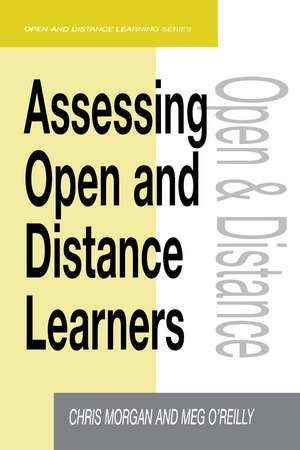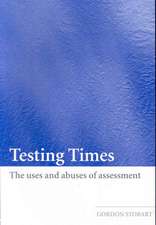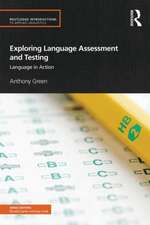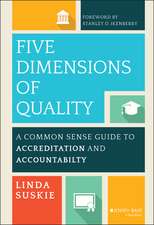Assessing Open and Distance Learners: Open and Flexible Learning Series
Autor Chris Morgan, Meg (both Lecturers O'Reillyen Limba Engleză Paperback – noi 1999
Din seria Open and Flexible Learning Series
-
 Preț: 252.02 lei
Preț: 252.02 lei - 21%
 Preț: 163.08 lei
Preț: 163.08 lei -
 Preț: 441.54 lei
Preț: 441.54 lei -
 Preț: 449.09 lei
Preț: 449.09 lei - 33%
 Preț: 384.59 lei
Preț: 384.59 lei -
 Preț: 454.86 lei
Preț: 454.86 lei -
 Preț: 490.99 lei
Preț: 490.99 lei -
 Preț: 443.24 lei
Preț: 443.24 lei -
 Preț: 433.86 lei
Preț: 433.86 lei -
 Preț: 194.33 lei
Preț: 194.33 lei -
 Preț: 401.70 lei
Preț: 401.70 lei - 18%
 Preț: 893.58 lei
Preț: 893.58 lei - 31%
 Preț: 317.60 lei
Preț: 317.60 lei - 31%
 Preț: 338.42 lei
Preț: 338.42 lei - 24%
 Preț: 208.93 lei
Preț: 208.93 lei -
 Preț: 425.87 lei
Preț: 425.87 lei - 22%
 Preț: 317.36 lei
Preț: 317.36 lei -
 Preț: 208.81 lei
Preț: 208.81 lei -
 Preț: 443.49 lei
Preț: 443.49 lei - 15%
 Preț: 472.94 lei
Preț: 472.94 lei - 26%
 Preț: 246.49 lei
Preț: 246.49 lei - 31%
 Preț: 341.46 lei
Preț: 341.46 lei - 18%
 Preț: 1279.05 lei
Preț: 1279.05 lei -
 Preț: 452.70 lei
Preț: 452.70 lei - 25%
 Preț: 205.20 lei
Preț: 205.20 lei -
 Preț: 416.87 lei
Preț: 416.87 lei -
 Preț: 303.21 lei
Preț: 303.21 lei -
 Preț: 416.83 lei
Preț: 416.83 lei -
 Preț: 450.07 lei
Preț: 450.07 lei -
 Preț: 205.54 lei
Preț: 205.54 lei - 15%
 Preț: 438.14 lei
Preț: 438.14 lei - 26%
 Preț: 986.10 lei
Preț: 986.10 lei -
 Preț: 480.35 lei
Preț: 480.35 lei
Preț: 309.57 lei
Nou
Puncte Express: 464
Preț estimativ în valută:
59.23€ • 62.01$ • 49.01£
59.23€ • 62.01$ • 49.01£
Carte tipărită la comandă
Livrare economică 05-19 aprilie
Preluare comenzi: 021 569.72.76
Specificații
ISBN-13: 9780749428785
ISBN-10: 0749428783
Pagini: 242
Dimensiuni: 156 x 234 x 19 mm
Greutate: 0.45 kg
Ediția:1
Editura: Taylor & Francis
Colecția Routledge
Seria Open and Flexible Learning Series
Locul publicării:Oxford, United Kingdom
ISBN-10: 0749428783
Pagini: 242
Dimensiuni: 156 x 234 x 19 mm
Greutate: 0.45 kg
Ediția:1
Editura: Taylor & Francis
Colecția Routledge
Seria Open and Flexible Learning Series
Locul publicării:Oxford, United Kingdom
Cuprins
Series editor's foreword -- Acknowledgements -- Introduction -- Part A: Issues and themes in open and distance assessment -- 1. Thinking about assessment -- Negative themes -- Positive themes -- Making sense of our reflections -- 2. Key issues and terms in assessment -- Explaining assessment -- Purposes of assessment: formative and summative -- Assessment: whose needs? -- Assessment and the learning context -- The grading game: norm and criterion referenced assessment -- 3. Assessment in open and distance contexts -- Introduction -- Open and distance learners' approaches to assessment -- Opportunities for assessment in open and distance learning -- Assessment and 'distance' -- Assessment and 'openness' -- Tensions in open and distance assessment -- Key qualities of open and distance assessment -- 4. Online technologies in open and distance assessment -- Introduction -- Opportunities presented by online learning and assessment -- Potential losses -- Reconceptualizing our pedagogy -- Part B: Assessing learners in open and distance learning -- 5. Designing assessment tasks -- Introduction -- Aligning assessment with objectives Selecting methods of assessment -- Which assessment methods are appropriate for open and distance learning? -- How much assessment is sufficient? -- How long should an assessment be? -- How should the assessments be spaced? -- What value should be placed on each item? -- Is the assessment practicable? -- Are your assessments valid and reliable? -- Are your assessment tasks authentic? -- Are your assessments open and inclusive? -- Conclusion -- Designing assessment tasks - at a glance Further resources -- 6. Communicating assessment tasks -- Communicating sufficient and clear information -- Developing marking criteria -- Moderating assessment tasks -- 7. Marking and grading -- Introduction -- Marking practices -- Feedback on assignments -- Marking turnaround time -- Awarding grades -- Authentication -- 8. Creating dialogue through assessment -- Facilitating dialogue in open and distance learning -- Making contact -- Communicating empathetically -- Communication breakdown -- Encouraging self-management and self-direction -- Developing communities of learners -- Mentoring -- Conclusion -- 9. Managing time -- Finding the time to make change -- Managing an assessment load Supporting learners to manage their time -- 10. Developing assessment policies -- Whole-of-course approach to assessment Student appeal procedures -- Extensions to assignments and special consideration -- Marking practices -- Plagiarism -- 11. Evaluating your assessment practices -- Evaluation in open and distance settings -- Purposes of evaluating assessment -- Types and methods of evaluation -- Conclusion -- Part C: Case studies -- 1. Thinking critically and making judgements -- 1.1 Think-aloud protocols -- 1.2 Discussion among learners -- 1.3 Diary to the teacher -- 1.4 Analytical thinking -- 2. Solving problems and developing plans -- 2.1 Collaborative decision making and clinical problem solving -- 2.2 Creative problem solving and constructive autonomy -- 2.3 Integrated planning project -- 2.4 Developing consulting skills -- 3. Performing procedures and demonstrating techniques -- 3.1 Developing expertise in neonatal resuscitation -- 3.2 Dissecting rats and providing evidence -- 3.3 Developing competences in writing research proposals -- 4. Managing and developing oneself -- 4.1 Contract for personal change -- 4.2 Participation in open learning -- 4.3 Becoming an OZKidsConnect volunteer -- 4.4 Whole-of-course portfolio -- 5. Accessing and managing information -- 5.1 Delivering a scientific research paper to an audience of peers -- 5.2 Sharing development and discussion of case study method -- 5.3 Presenting an exhibit at an arts conference -- 5.4 Writing a proposal, researching and reporting findings -- 6. Demonstrating knowledge and understanding -- 6.1 Testing knowledge using online multiple choice quizzes -- 6.2 Reasoning and logic -- 6.3 Simultaneous off- and on-campus multiple choice tests -- 6.4 Mathematics self-assessment on CD ROM -- 7. Designing, creating, performing -- 7.1 Designing online training -- 7.2 Video report of artistic development in ceramics -- 7.3 Conference and Web site for a science community -- 7.4 Creating and appreciating photographic expression -- 8. Communicating -- 8.1 Oral communication and audiotape interview -- 8.2 Computer conferencing -- 8.3 International debate -- 8.4 Online collaboration -- Appendix A Terms commonly used in assessment -- Appendix B Sample marking guide -- Appendix C Clinical competence assessment criteria -- References -- Index.
Notă biografică
Chris Morgan is lecturer and educational designers in the Teaching and Learning Centre at Southern Cross University, Australia. They work closely with academic and industry-based specialists to establish and ensure quality in open, distance and flexible learning programmes. Meg O'Reilly is lecturer and educational designers in the Teaching and Learning Centre at Southern Cross University, Australia. They work closely with academic and industry-based specialists to establish and ensure quality in open, distance and flexible learning programmes.











